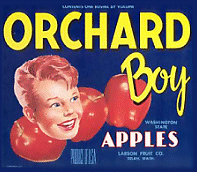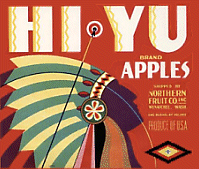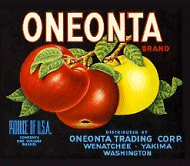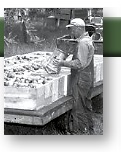Washington Apple Country History
Apple Packing Companies
Larson Fruit Company  Henry and Mildred Larson first started hand-packing apples for their neighbours during the Great Depression. Lugs of apples were loaded onto horse-drawn wagons and pulled from the orchards into the Larson barn. They were then washed and carefully wrapped in tissue paper before being placed into handmade wooden boxes for distribution. Over the course of the next two decades, as more and more growers brought their apples to Larson's makeshift packing house, the business expanded beyond the resources available at the family ranch. In 1955, Henry went into formal partnership with his two sons, Ross and Vern, to create Larson Fruit Company. Located in Selah, the firm currently provides storage and packing for multiple varieties of apples and pears grown in Washington. Vern Larson erected the company's first controlled atmosphere facility in 1963. As was the case with the original temporary packing house, the family has had to enlarge its CA capacity over the years. Today there is adequate space for approximately 100,000 bins of CA fruit and for 30,000 bins of fruit which require cold storage. All of these facilities are now monitored and controlled by computers, ensuring that Larson Fruit maintains the high quality for which the company has been known for generations.
Henry and Mildred Larson first started hand-packing apples for their neighbours during the Great Depression. Lugs of apples were loaded onto horse-drawn wagons and pulled from the orchards into the Larson barn. They were then washed and carefully wrapped in tissue paper before being placed into handmade wooden boxes for distribution. Over the course of the next two decades, as more and more growers brought their apples to Larson's makeshift packing house, the business expanded beyond the resources available at the family ranch. In 1955, Henry went into formal partnership with his two sons, Ross and Vern, to create Larson Fruit Company. Located in Selah, the firm currently provides storage and packing for multiple varieties of apples and pears grown in Washington. Vern Larson erected the company's first controlled atmosphere facility in 1963. As was the case with the original temporary packing house, the family has had to enlarge its CA capacity over the years. Today there is adequate space for approximately 100,000 bins of CA fruit and for 30,000 bins of fruit which require cold storage. All of these facilities are now monitored and controlled by computers, ensuring that Larson Fruit maintains the high quality for which the company has been known for generations.
Matson Fruit Company  The Matson family operation dates back to 1908, when Sven August Matson planted his first apple orchard on twenty acres of land just northwest of Selah. Nearly a century later, in addition to retaining the farm land close to this original site, Matson Fruit owns and operates several orchards in the Yakima Valley. Their first packing house was built in the 1930s and contained two unusual enhancements for its time: a machine which made wooden boxes and flow belts. Workers would take these boxes out to the orchards and gather the harvest. When the freshly picked apples came back to the packing house, they were hand dumped and sorted. Each apple was placed onto the various belts to the sizers, where they were then measured by weight and placed accordingly into square wooden tubs. Packers took each apple from these tubs, folded the prize into fruit wrap, and packed each one back into the wooden apple boxes. The final step in this early and arduous process was a wooden lid nailed to the top of each box. Today, Matson Fruit Company employs the very latest in technology for their CA storage and packing facilities in Selah.
The Matson family operation dates back to 1908, when Sven August Matson planted his first apple orchard on twenty acres of land just northwest of Selah. Nearly a century later, in addition to retaining the farm land close to this original site, Matson Fruit owns and operates several orchards in the Yakima Valley. Their first packing house was built in the 1930s and contained two unusual enhancements for its time: a machine which made wooden boxes and flow belts. Workers would take these boxes out to the orchards and gather the harvest. When the freshly picked apples came back to the packing house, they were hand dumped and sorted. Each apple was placed onto the various belts to the sizers, where they were then measured by weight and placed accordingly into square wooden tubs. Packers took each apple from these tubs, folded the prize into fruit wrap, and packed each one back into the wooden apple boxes. The final step in this early and arduous process was a wooden lid nailed to the top of each box. Today, Matson Fruit Company employs the very latest in technology for their CA storage and packing facilities in Selah.
Northern Fruit Company  Northern Fruit Company was founded by Roy Tedford in 1928. He started by purchasing fruit for cash, and continued this practice successfully throughout The Great Depression. After the war, son Rex took over management of the business and consigned that post to his own son, Duane, thirteen years later. Duane Tedford was killed in a plane crash in 1969. The sales manager at the time, Jim Pauly, stepped up to managment; four years later, in 1973, he and two other sales partners bought Northern Fruit from the Tedford family. Like other Washington packing companies, Northern has seen a tremendious evolution in its storage and assembling practices during these last thirty years. Utilising the most up-to-date advances in modern technology, the plant employs a "brush drop" transfer to direct pack lines. This means that apples are handled only once, which, in turn, helps minimize possible bruising to the fruit. Among the destinations for Northern Fruit products are Canada and Mexico; Russia; the Middle East; Southeast Asia; Central America; and the Pacific Rim countries.
Northern Fruit Company was founded by Roy Tedford in 1928. He started by purchasing fruit for cash, and continued this practice successfully throughout The Great Depression. After the war, son Rex took over management of the business and consigned that post to his own son, Duane, thirteen years later. Duane Tedford was killed in a plane crash in 1969. The sales manager at the time, Jim Pauly, stepped up to managment; four years later, in 1973, he and two other sales partners bought Northern Fruit from the Tedford family. Like other Washington packing companies, Northern has seen a tremendious evolution in its storage and assembling practices during these last thirty years. Utilising the most up-to-date advances in modern technology, the plant employs a "brush drop" transfer to direct pack lines. This means that apples are handled only once, which, in turn, helps minimize possible bruising to the fruit. Among the destinations for Northern Fruit products are Canada and Mexico; Russia; the Middle East; Southeast Asia; Central America; and the Pacific Rim countries.
Oneonta Trading Corp  This Wenatchee-based packing company derives its name from the indigenous language of the Northeast American Indians. The Iroquois word, "Onaanta," has but two (of many) translations which perfectly describe the panorama of central Washington. It means "mountain," or "where the rocks crop out." Reflecting the innovative and pioneering spirits of those who had blazed America's trail westward in the ninteenth century, founder Paul Thomas cast about for ways to ensure the growth of Oneonta during The Great Depression. The company was already an established shipper of fresh fruits, so Thomas began packing apples and pears into whiskey barrels. This cargo was then insulated in sawdust and prepared for shipment by rail, truck, and steamer to ports both national and world-wide. From its sedulous and steadfast genesis, Oneanta today maintains state-of-the-art packing facilities in no less than five locations, from Brewster to Yakima.
This Wenatchee-based packing company derives its name from the indigenous language of the Northeast American Indians. The Iroquois word, "Onaanta," has but two (of many) translations which perfectly describe the panorama of central Washington. It means "mountain," or "where the rocks crop out." Reflecting the innovative and pioneering spirits of those who had blazed America's trail westward in the ninteenth century, founder Paul Thomas cast about for ways to ensure the growth of Oneonta during The Great Depression. The company was already an established shipper of fresh fruits, so Thomas began packing apples and pears into whiskey barrels. This cargo was then insulated in sawdust and prepared for shipment by rail, truck, and steamer to ports both national and world-wide. From its sedulous and steadfast genesis, Oneanta today maintains state-of-the-art packing facilities in no less than five locations, from Brewster to Yakima.
|





